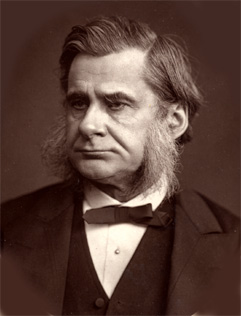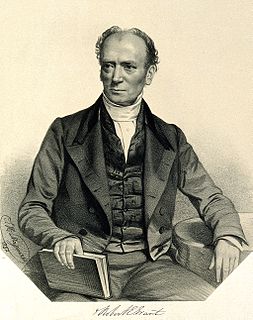Evolutionism is a term used to denote the theory of evolution. Its exact meaning has changed over time as the study of evolution has progressed. In the 19th century, it was used to describe the belief that organisms deliberately improved themselves through progressive inherited change (orthogenesis). The teleological belief went on to include cultural evolution and social evolution. In the 1970s the term Neo-Evolutionism was used to describe the idea "that human beings sought to preserve a familiar style of life unless change was forced on them by factors that were beyond their control".

Thomas Henry Huxley was an English biologist and anthropologist specialising in comparative anatomy. He is known as "Darwin's Bulldog" for his advocacy of Charles Darwin's theory of evolution.

Theistic evolution, theistic evolutionism, evolutionary creationism, divine direction, or God-guided evolution are views that regard religious teachings about God as compatible with modern scientific understanding about biological evolution. Theistic evolution is not in itself a scientific theory, but a range of views about how the science of general evolution relates to religious beliefs in contrast to special creation views.

Robert Waring Darwin was an English medical doctor, who today is best known as the father of the naturalist Charles Darwin. He was a member of the influential Darwin-Wedgwood family.

Robert Edmond Grant MD FRCPEd FRS FRSE FZS FGS was a British anatomist and zoologist.

Transmutation of species and transformism are 19th-century evolutionary ideas for the altering of one species into another that preceded Charles Darwin's theory of natural selection. The French Transformisme was a term used by Jean Baptiste Lamarck in 1809 for his theory, and other 19th century proponents of pre-Darwinian evolutionary ideas included Étienne Geoffroy Saint-Hilaire, Robert Grant, and Robert Chambers, the anonymous author of the book Vestiges of the Natural History of Creation. Opposition in the scientific community to these early theories of evolution, led by influential scientists like the anatomists Georges Cuvier and Richard Owen and the geologist Charles Lyell, was intense. The debate over them was an important stage in the history of evolutionary thought and would influence the subsequent reaction to Darwin's theory.
Essays and Reviews, edited by John William Parker, published in March 1860, is a broad-church volume of seven essays on Christianity. The topics covered the biblical research of the German critics, the evidence for Christianity, religious thought in England, and the cosmology of Genesis.

The Expression of the Emotions in Man and Animals is Charles Darwin's third major work of evolutionary theory, following On the Origin of Species (1859) and The Descent of Man (1871). Initially intended to be a chapter in The Descent of Man, it was published separately in 1872 and concerns the biological aspects of emotional life. In this book, Darwin sets out some early ideas about behavioural genetics, and explores the animal origins of such human characteristics as the lifting of the eyebrows in moments of surprise and the mental confusion which typically accompanies blushing. A German translation of The Expression appeared in 1872; Dutch and French versions followed in 1873 and 1874. A second edition of the book, with only minor alterations, was published in 1890. Since its first publication, The Expression has never been out of print, but it has also been described as Darwin's "forgotten masterpiece".

Elizabeth Janet Browne is a British historian of science, known especially for her work on the history of 19th-century biology. She taught at the Wellcome Trust Centre for the History of Medicine, University College, London, before returning to Harvard. She is currently Aramont Professor of the History of Science at Harvard University.
Charles Darwin's education gave him a foundation in the doctrine of Creation prevalent throughout the West at the time, as well as knowledge of medicine and theology. More significantly, it led to his interest in natural history, which culminated in his taking part in the second voyage of the Beagle and the eventual inception of his theory of natural selection. Although Darwin changed his field of interest several times in these formative years, many of his later discoveries and beliefs were foreshadowed by the influences he had as a youth.

David Quammen is an American science, nature and travel writer and the author of fifteen books. He wrote a column called "Natural Acts" for Outside magazine for fifteen years. His articles have also appeared in National Geographic, Harper's, Rolling Stone, the New York Times Book Review and other periodicals. In 2013, Quammen's book Spillover was shortlisted for the PEN/E. O. Wilson Literary Science Writing Award.
John Joseph Bennett was a British botanist.
John Chapman was an English publisher who acquired the influential radical journal, the Westminster Review. His assistant editor and lodger Mary Ann Evans later wrote classic novels under the name George Eliot.
The Darwin Industry refers to historical scholarship about, and the large community of historians of science working on, Charles Darwin's life, work, and influence. The term "has a slightly derogatory connotation, as if the scale of the research has gotten out of control with people cranking out studies on perhaps less and less important aspects of Darwin's work"; but it was originally a self-designation of the scholars who began re-evaluating Darwin and studying his manuscripts and correspondence in the second half of the 20th century.

The Plinian Society was a club at the University of Edinburgh for students interested in natural history. It was founded in 1823. Several of its members went on to have prominent careers, most notably Charles Darwin who announced his first scientific discoveries at the society.
William Chilton, was a printer, Owenite, evolutionist, and co-founder with Charles Southwell of The Oracle of Reason, which claimed to be the world's first avowedly atheist journal.
This prize should not be confused with the Watson Davis Award from the Association for Information Science and Technology.
The Watson Davis and Helen Miles Davis Prize of the History of Science Society is awarded yearly for a book published, during the past three years, on the history of science for a wide public. The book should "introduce an entire field, a chronological period, a national tradition, or the work of a noteworthy individual." The book can be written by multiple authors or editors and is required to be written in English and suitable for an audience including undergraduates and readers without specialized, technical knowledge. The author receives 1,000 U.S. dollars and a certificate. The prize, established in 1985, is named in honor of Watson Davis and Helen Miles Davis who were science popularizers in the USA.











